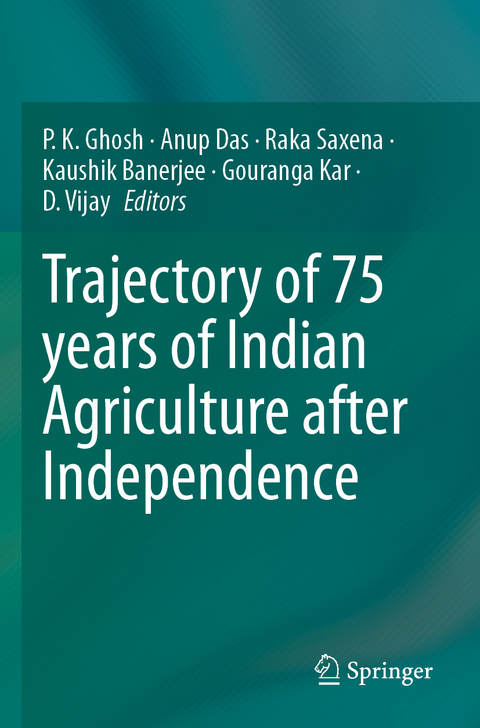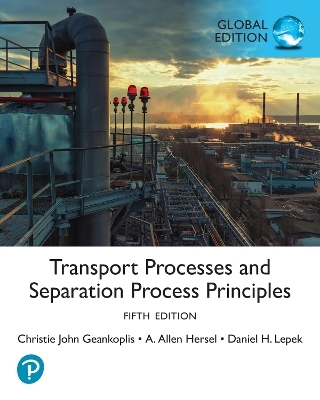
Trajectory of 75 years of Indian Agriculture after Independence
Springer Verlag, Singapore
978-981-19-7999-6 (ISBN)
This edited book focus on highlighting the evolution of Indian agriculture over the past 75 years of independence, covering every sector, viz. crop science, horticulture, management of biotic & abiotic stress, post-harvest quality management, livestock, fisheries, mechanization, marketing and human resource development. The book has 30 chapters from most experienced researchers and academicians who are actively engaged in research work on the subject area of the book. The book is in line with the strategy for new India @ 75’ brought out by NITI Ayog. It highlights India’s success stories in innovation, technology, enterprise and efficient management together to achieve overall growth while making available food, required nutrition and others ecological services. It also asses the India’s preparedness in terms of commitment toward sustainable development goal SDG). The book is a relevant reading material for both students and researchers and policy makers.
DR. P K GHOSH working as Founder Director and Vice Chancellor, ICAR-National Institute of Biotic Stress Management (NIBSM), Raipur, earlier demonstrated leadership as National Coordinator, National Agricultural Higher Education Project -World Bank aided project, ICAR, New Delhi, Director, Indian Grassland and Fodder Research Institute, Jhansi and Head, Crop Production Division, Indian Institute of pulses Research. His pioneering works are on climate change, carbon sequestration, Resource use efficiency, conservation agriculture, crop diversification, soil water conservation, Integrated Farming System . He has been identified as one of the two percent of agricultural scientists at global level and Member, Royal Society of Research, London. He is recipient of 19 national awards including M.S. Randhawa Memorial Award for best Administration and also Fellow of National Academy of Sciences, India and National Academy of Agricultural Sciences (NAAS), and three professional society. He served as Chairman by organizing 23rd International Grassland Congress (IGC) held first time in India, executive member of IGC continuing committee representing South-East Asia, Sectional President, Agricultural section of Indian Science Congress. Editor-in-chief, National Academy of Science, India. Considering his academic, administrative and research excellence he was selected as co-opted member of DFI Committee, constituted by PMO and contributed to bring 14 volumes on DFI. He also formulated four policy papers for the country. He published 20 books and 167 research papers in the high impact factor journals with the total citation of 7947, h-index of 40 and i-10 index of 90 and total publication of 304. DR. ANUP DAS is presently serving as Principal Scientist (Agronomy) at ICAR Research Complex for NEH Region, Tripura Centre, India. His extensive research works led to development of package of practices for no-till production of pulses and oilseeds in rice and maize fallow areas; organic production packages of 33 important crops on cropping system approach; standardization of Modified System of Rice Intensification and Raised and Sunken Bed land configuration, watershed based Integrated Farming System models, produce quality, input use efficiencies, soil properties and C-pools under different land uses and management practices. He has guided/ co-guided 17 masters and two Ph.D students and taught 6 courses to PG students. He has published 200 research articles, 74 books, compendium & technical bulletins, and many other documents with total citation of 4000 and h-index of 36 in his credit. He is actively involved in technology transfer for livelihood improvement of farmers through large scale capacity building programme and demonstrations benefitting about 50,000 farmers in north east India. He has received several National awards like ICAR-Lal Bahadur Shastri outstanding young scientist award, Swami Sahajanand Saraswati outstanding extension scientist award, Fakhruddin Ali Ahmed award for improving tribal farming system, ICAR-Inter-disciplinary team research award in natural resource management and First Dr. H.K. Jain – CAU, Imphal Award for research excellence in north east India among many others. Dr. Das is recipient of the prestigious Fellowships of National Academy of Agricultural Sciences (2019), Indian Society of Agronomy (2017), Indian Association of Hill Farming (IAHF-2017) and Society for Biotic and Environmental Research (2020). DR RAKA SAXENA is currently working as a Principal Scientist at ICAR-National Institute for Agricultural Economics and Policy Research (NIAP), located in New Delhi, India. Her areas of interest in research include agricultural trade, animal science, and agricultural economics. She has more than 15 years of research experience and has published more than 50 papers in prestigious publications on anational and worldwide scale. In addition, she has written more than 20 book chapters and eight policy papers, briefs, and working papers. She has contributed via innovative, multi-disciplinary, and multi-institutional initiatives that are founded on evidence-based policy insights. She maintained her research agenda with a focus on the urgent need for prioritizing and evaluating agricultural research in order to directly benefit the nation's farmers. She focused on two important aspects of the country's agriculture, notably those that dealt with market intelligence for handling price volatility and enhancing farmers’ incomes. Her most recent study focuses on methods for maximizing the potential of the agricultural trade to raise farm incomes. DR. GOURANGA KAR is presently the Director of ICAR-Central Research Institute for Jute and Allied Fibres (ICAR-CRIJAF), Barrackpore. Earlier he served as Principal Scientist, ICAR-Indian Institute of Water Management, Bhubaneswar. He has done pioneering contribution in quantification of water footprint in India on farm scale and designed & implemented many national / international project related to water and watershed management, crop growth modelling, climate change research, mitigation and adaptation, land use and cropping system using RS and GIS. He developed GIS based decision rules to prepare sustainable alternative land-use plan on watershed basis. To increase crop productivity and cropping intensity of rainfed rice agro-ecosystem, he has developed crop diversification technology along with in-situ soil conservation, technologies of modification of microclimate, low cost soil amelioration of acidic land, irrigation scheduling of crops of post-rice season. He has designed innovative flood water harvesting system, on-dyke agro-forestry, pond based farming and standardized cultivation of salt resistant crops for coastal agro-ecosystem, designed site specific groundwater recharge structures and validated in different agro-climatic regions of the country. He also significantly contributed in standardizing dugwell based drip-fertigation system to obtain higher land and crop productivity of vegetable crops. He has published more than 200 research papers, review paper and book chapters of immense academic as well as practical importance. He is also fellow of different scientific Societies like National Academy of Agricultural Sciences (FNAAS), Indian Society of Soil Science (FISSS), Indian Association of Soil and Water Conservationists (FIASWC), Association of Agro-meteorologists (FAAM), and West Bengal Academy of Science and Technology (FWAST), Indian Society of Coastal Agricultural Research (ISCAR). Also he is a recipient of many prestigious awards namely; ICAR Vasant Rao Naik Award 2004; IARI Sukumar Bosu Memorial Award; ASWC Dr. K. G. Tejwani Award 2006; ICAR Hari Om Ashram Trust Award 2007-08; USDA Norman Borlaug International Agricultural Science and Technology FellowshipAward 2008; NAAS Recognition Award 2012; ICAR-Swami Sahajananda Saraswati Award 2019; Rajbhasa Gaurav Puraskar 2019. DR KAUSHIK BANERJEE is a Principal Scientist from ICAR-National Research Centre for Grapes, Pune. He is heading the National Reference Laboratory on pesticide residues and mycotoxins in India. His area of research focuses on the development of efficient analysis methods for the sensitive and confirmatory estimation of pesticide residues and mycotoxins in agricultural and food matrices and risk assessment studies for the fixation of crop-specific maximum residue limits. Dr Banerjee’s extensive contributions to science and the community have earned him numerous national and international laurels. He received the prestigious Harvey W. Wiley Award of AOAC INTERNATIONAL in 2017 and the Recognition Award of the National Academy of Agricultural Sciences (NAAS) in 2019. Earlier, he was named as a Fellow by the Royal Society of Chemistry (FRSC), NationalFellow- Indian Council of Agricultural Research, and Fellow-NAAS. DR. D. VIJAY is a Principal Scientist at ICAR-Indian Agricultural Research Institute, New Delhi and has more than 17 years of research, teaching and extension experience in seed science and technology. He specialized in seed physiology and has good expertise in seed production of various crops, including grass species. He worked as a zonal seed production officer and nodal officer (seed) in different institutes for more than nine years. He published more than 30 research articles in various national and international journals, two books, ten book chapters and several bulletins, compendium ch apters and training manuals. He is a gold medalist in UG and PhD and received several young/best scientist awards from different academic societies and is an associate fellow of the Range Management Society of India. He is an editorial board member of four journals and delivered more than 30 invited lectures in severalnational and international training programs. He guided 3 MSc students and presently guiding 4 PhD students at ICAR-IARI. He got nominated as a Regional Representative, India of the International Society for Seed Science, UK.
Chapter 1. Indian agriculture @75: Unraveling the trend and Trajectory.- Chapter 2. Contribution towards food supply and security.- Chapter 3. Changing Structure of Rural Employment and its Implications for Agriculture in India.- Chapter 4. Contributions of Technologies to Agricultural Development in India.- Chapter 5. Evolution of The Indian Seed Sector and its Role in Agricultural Growth.- Chapter 6. Rice research in India: A historical perspective.- Chapter 7. Wheat.- Chapter 8. Maize and Millets.- Chapter 9. Pulses.- Chapter 10. Role of Oilseeds and Oil Palm in Food, Nutritional and Income Security.- Chapter 11. Indian Horticulture @75 years of Independence.- Chapter 12. Growth and Developments in Livestock Sector.- Chapter 13. Fishery.- Chapter 14. Status of commercial crops (Jute, Cotton and Sugarcane).- Chapter 15. Natural Resource Management to attain Food and Environment Security.- Chapter 16. Water.- Chapter 17. Land – a vital component of natural resource: Pre- and post-Independence status, challenges and options to achieve food and environmental security in India.- Chapter 18. Farm Mechanization.- Chapter 19. Forests to attain Food and environment security.- Chapter 20. Agrometeorological Research in India Towards Food and Environment Security.- Chapter 21. Sustainable Production Systems in Indian Agriculture.- Chapter 22. Dryland Agriculture.- Chapter 23. Biotic stress management in India– an endless fight since pre-independence.- Chapter 24. Invasive and Transboundary Pests.- Chapter 25. Bio pesticides.- Chapter 26. Trajectory of Market Reforms in India Facts and Foundation.- Chapter 27. Prospects of Agribusiness and Entrepreneurship.- Chapter 28. The Food Processing Industry in Post-Independence Era: Performance and Way Forward.- Chapter 29. Transformation of Agricultural Extension System in India.- Chapter 30. Recent policy reforms in India.
| Erscheinungsdatum | 07.09.2024 |
|---|---|
| Zusatzinfo | 1 Illustrations, black and white; XV, 790 p. 1 illus. |
| Verlagsort | Singapore |
| Sprache | englisch |
| Maße | 155 x 235 mm |
| Themenwelt | Technik ► Umwelttechnik / Biotechnologie |
| Weitere Fachgebiete ► Land- / Forstwirtschaft / Fischerei | |
| ISBN-10 | 981-19-7999-5 / 9811979995 |
| ISBN-13 | 978-981-19-7999-6 / 9789811979996 |
| Zustand | Neuware |
| Haben Sie eine Frage zum Produkt? |
aus dem Bereich


